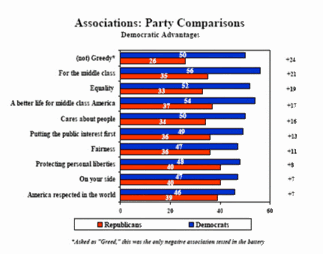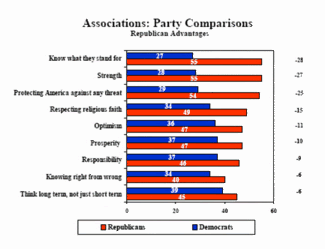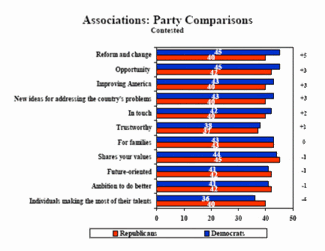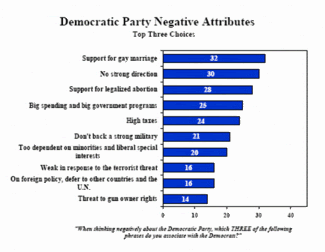What the report uses as its conclusion, I want to use as my starting point:
In this test, the Republicans say their most important principle is “self-sufficiency,” and everything else follows from that. The Democrats say their most important principle is “increasing opportunity and community,” and similarly, construct a framework of connected ideas.When the surveyors constructed competing frameworks built pivotally around the concepts of Self-Sufficiency verses Opportunity and Community, the participants favored the latter (Democratic) framework by a 6-point margin (51-45%).

This result is clearly indicative of the opportunity available to Democrats, if we can get our shit together.
The first step toward that end is examining what our advantages are, so we can play to them, and what their disadvantages are, so we can exploit them.

Simply being Not Greedy might, on its face, seem a bit lackluster, but the truth is, it’s very valuable, particularly when extended as a concept beyond our own borders. Being the party that best represents the spirit of American generosity (a point of pride among many Americans, despite the fact that we often don’t do much to earn it—see: Hotel Rwanda) is a great place to start, and in terms of its domestic usage, coupling it with our next highest advantage—being for the middle class—we have at our disposal another great American fallacy; there are very few Americans who don’t consider themselves middle class.
Generally speaking, we are seen as the party of doing right by people, fighting for equality, fairness, and the little guy. By contrast, the Republicans are seen as the party of strength and clarity. I believe once we begin to solidify and effectively communicate our vision, we’ll make grounds on the latter (which should also help close the Optimism gap—memorably promoting our own ideas in tandem with criticizing the other guys’).

There are certain advantages I believe we have to cede to the Republicans, and Respecting Religious Faith is one of them. There are, quite simply, too many conservatives who will never be willing to reconcile religious tolerance and support for gay rights or abortion rights, or any of a number of other social issues that are integral parts of our platform. I don’t believe it helps our cause to suddenly declare ourselves “praying people,” or try to awkwardly inject religious rhetoric into campaign speeches. It doesn’t sound authentic to my ears (I doubt I’m alone), and ticking off your god-lovin’ bona fides in the same speech where you support legalized abortion just doesn’t play to many religious people. When we talk about religion, we need to talk about a general respect for religious faith, as opposed to trying to out-maneuver the Republicans for the coveted Right Hand of God slot. The best we can do is try to reframe the argument so that it’s less about how religious a candidate is and more about how respectful of faith (or the lack thereof) a candidate is.
There are also a good number of attributes in which both parties fall close to or within the margin of error:

We can look at this chart one of two ways: A) that it is reflective of a divided electorate, leaving little room for headway in either direction; or B) that this list tells us exactly where we most need to look to differentiate ourselves.
The truth is, it depends on the line item. Some of these are very squishy; Reform and Change, Opportunity, Improving America…it all depends on one’s own interpretations. Some think partially privatizing Social Security would be an improvement; some think extending the assault weapons ban would be an improvement. Many of these answers would be, I imagine, more ideologically driven than some of the others, rendering them part of rationale A.
Rationale B then, must address those where redefinition and refinement are viable: Shares Your Values, Future-Oriented, and Ambition to Do Better. What this list has in common is that they are all completely unquantifiable. (Technically, I know Share Your Values can be reasonably quantified, but the idea here is not whether our party actually Shares Values, but whether our party is perceived to Share Values—a conclusion reached by voters viscerally, not by examination of historical legislation.)
One of our greatest assets as legislators is our penchant for nuance, for wonkiness, for the facts and the figures. It’s also our Achilles’ Heel come election time. It isn’t enough to actually Share Values with a majority of the electorate; we must learn to convey the notion that we want to Share Values with them, that we do Share Values with them, and that they Share Values with us. (As I recall, John Edwards was particularly adept at turning that one on its head, as well it should be—making people consider and question their party affiliation, rather than constantly appealing as an alternative. You might be a Democrat if… We might already be your real first choice…if you think about it.)
Also worthy of attempting to differentiate ourselves is Trustworthiness. The leadership of the two parties are not even in the same league, and yet we are virtually tied. This is the responsibility of the Congressional Leadership, to hammer home loudly and repeatedly the misrepresentations, miscontextualizations, and outright lies perpetrated by this administration on a regular basis. There’s no reason we should be ahead of the Republicans by a negligible margin on this issue, except for our lack of willingness to call a spade a spade (and a lie a damn lie). The D.C. Dems have been so lax in their responsibilities to the truth that when Mark Warner used the L-word, it was media worthy. A sad state of affairs, considering this administration’s nonexistent relationship with the truth, but also clearly in our favor at this moment in time; if we call them on it, the stories will follow.
Okay, this is getting a bit long-winded, even after severely editing myself, so I’m going to move on to one final point, and then wrap it up, leaving further discussion for comments.
This last chart seems to have captured most of the attention around the blogosphere, and probably rightfully so.

The consensus, I’ve been relieved to see, is that we shouldn’t move anywhere on the social issues: Support for Gay Marriage and Support for Legalized Abortion. (Big Government also arguably falls into this category, as many who regard it as a weakness likely do so because of federal social programs.) Not only would it be an affront to liberalism to weaken our support on any of the above, but it’s frankly pointless, as homophobes and right-to-lifers are never going to vote Democratic, anyway. In fact, moving center on these issues would likely be tantamount to political suicide, as the party progressives would be marginalized and the Right would (accurately) describe Dems as flip-floppers (a change we are well aware has sticking power and resonates with the American public).
No Strong Direction is the thorn in our side that must be immediately addressed. The one thing this report seems to suggest to me is that the direction is clearly not toward the center. We need a progressive, populist message, a candidate who believes in it, and a grassroots movement prepared to support, reinforce, and fund it.
Well, one out of three ain’t bad…




Shakesville is run as a safe space. First-time commenters: Please read Shakesville's Commenting Policy and Feminism 101 Section before commenting. We also do lots of in-thread moderation, so we ask that everyone read the entirety of any thread before commenting, to ensure compliance with any in-thread moderation. Thank you.
blog comments powered by Disqus